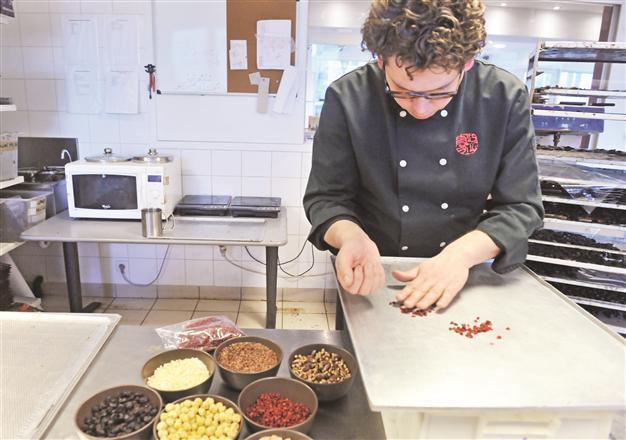Chocolatiers face up to new tastes
BRUSSELS - Agence France-Presse

Laurent Gerbaud, one of the leader figures of the new generation of chocolate makers is working at his workshop in the center of Brussels. AFP photo
Belgium is rightly proud as producer of some of the world’s finest chocolate but changing tastes and new markets in Asia and the Arab world are shaking up its somewhat predictable chocolate scene.
“Belgian traditional chocolates? Some people still do them really well, such as the major brands,” said Laurent Gerbaud, one of the new generation of chocolatiers trying to keep up with a discerning clientele.
In his workshop in the centre of Brussels, a customer will find few traces of the Manon, the praline filled with coffee-flavored cream and covered in white chocolate which has been the industry mainstay for decades.
Gerbaud instead offers small chocolates made with exotic and unusual flavorings; figs from Turkish province of İzmir, the bitter berries of the Barberry tree, Cape pears or Yuzu, a citrus fruit from Japan.
“My priority is clear, simple flavors, using the best ingredients possible. My chocolates use less sugar and fat in response to increasing demand,” Gerbaud said.
Such chocolates with a bitter and sharp edge were first made in France in the 1990s as artisan chocolatiers came onto the scene.
In Belgium, the trend has been slower to get off the ground in an industry dominated by such illustrious names as Leonidas, Godiva, Cote d’Or or Neuhaus. But that is beginning to change, with new brands coming through, even if progress is slow and Belgium’s some 400 artisan chocolatiers remain wary of getting carried away.
“It is extremely difficult to establish a brand, to build up a clientele and to be profitable. After 11 years, I still do not have profits,” says Gerbaud, one of the best in the business.
Traditional brands fight back For the established brands, the challenge is different, needing to find new markets if they are to expand beyond their home base.
Leonidas was founded after the 1913 International Exhibition by Leonidas Kestekides, a Greek pastry maker who decided to settle in Belgium, and the company is using the 100th anniversary celebrations to update its offering.
Kestedides’ descendants still run the business, with the Leonidas brand known worldwide through some 1,300 outlets in 50 countries, selling 6,000 tonnes a year or one million chocolates a day.
“It is clear that our potential for development lies more in the emerging economies rather than in the mature market here in Europe,” said Hugues Moens, commercial director for Leonidas.
China, already home to 40 Leonidas shops, and the Arab world are now the priority for the company.
